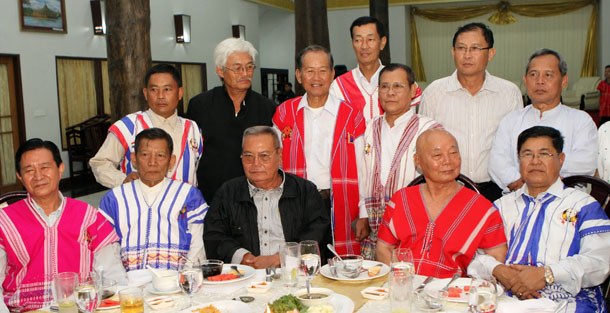CHIANG MAI, Thailand — The decision of Burma’s oldest ethnic armed group, the Karen National Union (KNU), to sign a so-called nationwide ceasefire agreement is a bold step that has generated no small amount of controversy.
The group’s senior leadership remains divided and broader opposition to the signing emerged earlier this month with the release of a joint-statement, signed by more than 40 ethnic Karen civil society organizations, accusing the KNU of making an “undemocratic” decision.
By signing the nationwide ceasefire agreement (NCA), KNU leaders had violated their own political and military procedures, the statement said, and had not received the consent of a majority of the group’s central executive committee members.
The Karen organizations, drawn from across the world, accused a minority of KNU leaders of lacking transparency and of “disregarding the true meaning of ‘nationwide’ ceasefire.”
Seven ethnic armed groups have committed to signing the pact, which negotiators say will be officially concluded on Oct. 15, while other key stakeholders will abstain. Of the seven groups, three are ethnic Karen.
Naw Wah Khu Shee, a Karen women’s rights activist and spokesperson for the coalition of Karen civil society organizations, told The Irrawaddy the signing would only lend credence to the incumbent government at a time of ongoing conflict in ethnic areas.
“I think the KNU should not rush into signing the NCA while offensives are still going on in Shan State and Kachin State. Signing the NCA will only give legitimacy and credibility to the government,” she said.
“The KNU and other ethnic armed organizations that decided to sign should seriously consider the unifying call for inclusiveness for all ethnic armed groups.”
However, not all KNU leaders back the long-awaited signing and debates have raged within the group’s leadership.
A senior member of the KNU’s military wing, the Karen National Liberation Army (KNLA), confirmed the leadership was split between “those who are ready” to sign and those wishing to hold out.
The pro-ceasefire faction, led by KNU chairman Mutu Sae Poe, contend the time is right to engage in the political process.
Kwe Htoo Win, general secretary of the KNU and a Mutu Sae Poe supporter, told The Irrawaddy in a recent interview that although there were different opinions within the organization, the outcome reflected the will of the majority.
“The decision was made democratically by the KNU central committee based on the principles and goals of the KNU, and therefore no one will reject this decision. They may have their own wishes and views, but we have to follow the decision of the majority,” he said.
The opposing internal faction, led by vice-chairperson Naw Zipporah Sein, has long urged a more cautious approach to ceasefire negotiations.
While divisions within the KNU are nothing new, the current factional divide dates back to late 2012, after Mutu Sae Poe was elected chairman.
However, one of the most active players in the pro-NCA bloc is reportedly Htoo Htoo Lay, a senior KNU leader close to the Norway-backed Myanmar Peace Support Initiative and the Brussels-based Euro-Burma Office.
Behind the Scenes
Htoo Htoo Lay is thought to be close to Shan leader Harn Yawnghwe, head of the Euro-Burma Office.
The two men, who are believed to wield significant influence over the political direction of the KNU and the Restoration Council of Shan State (RCSS) respectively, are very much pro-ceasefire and have seemingly adopted the government’s view that the civil war can be terminated through economic inducements and development projects.
At a recent summit of ethnic armed groups in the northern Thai city of Chiang Mai, Htoo Htoo Lay was prominent in actively extolling the benefits of the NCA to his fellow ethnic representatives.
Sources believe Htoo Htoo Lay and Harn Yawnghwe have had a significant influence on Burma’s peace process from behind the scenes since bilateral agreements were first signed under Thein Sein’s government.
Harn Yawnghwe, who was a key backer of the Ethnic Nationalities Council (ENC)—an alliance of ethnic armed groups established in 2004—is reported to have his own long-term vision of the post-ceasefire political landscape, including transforming armed groups into legal organizations to contest future elections.
While Western interlocutors may see him as a pragmatic negotiator, in the past, Harn Yawnghwe has been at the center of friction within the ethnic alliance movement. A group of ENC leaders dissatisfied with his views broke away to form the United Nationalities Federal Council (UNFC) in 2011.
Harn Yawnghwe has also served as a senior advisor to the RCSS and formed the Pyidaungsu Institute in 2013 with the aim of monitoring the peace process and providing assistance. Htoo Htoo Lay serves on the organization’s board.
While the three Karen armed groups have formally backed the ceasefire, divisions within each group continue to bubble beneath the surface. The Oct. 15 signing, billed as a historic moment in Burma’s history of civil war, may yet presage more ethnic disunity.

















